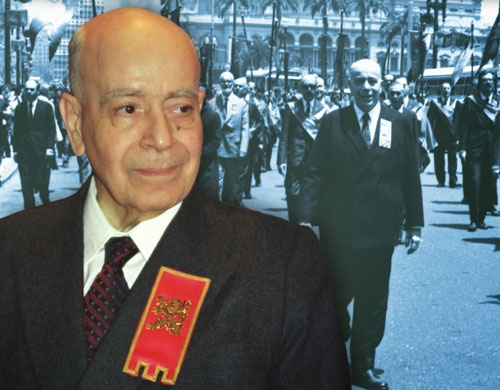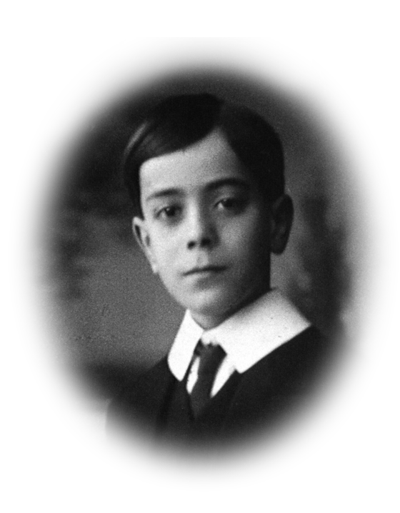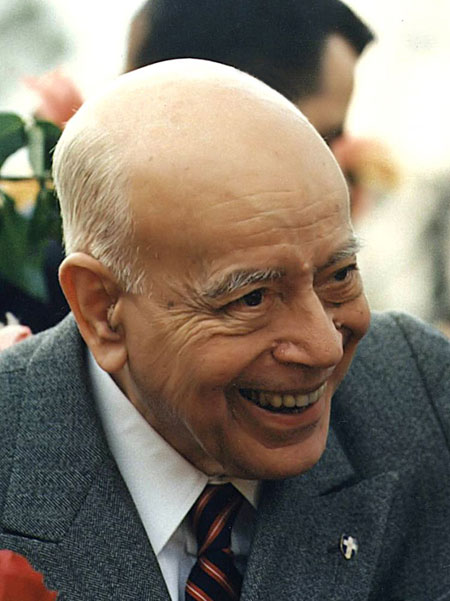Plinio Corrêa de Oliveira
inspirer of all TFP’s found today on five continents
Biographical Facts
- Born and baptised in Sao Paulo, Brazil, in 1908.
- Educated at the Saint Louis Jesuit High School, Sao Paulo, and the Law School of the University of Sao Paulo.
- Active as a youth in the Marian Congregations and University Catholic Action.
- Legal advisor to the Archdiocese of Sao Paulo.
- Editor of the newspaper Legionario.
- Candidate for the Catholic Electoral League.
- Member of the Constitutional Assembly of Brazil where he advocated a Catholic viewpoint in contrast to the secularist sentiment of many Assemblymen.

- President of Catholic action.
- In the 1930s an outspoken critic of the Integralistas (Brazilian Fascists).
- In the later twentieth century an outspoken critic of the emerging Brazilian Left, especially Marxist-oriented Catholics.
- Lecturer in Modern and Contemporary History at the Pontifical Catholic University, Sao Paulo.
- Founder of influential current affairs magazine Catolicismo.
- Founder of the Brazilian Society for the Defence of Tradition, Family and Property.
- Author of 15 books and over 2,500 newspaper and magazine articles.
- Passed away in 1995 in Sao Paulo.
A contemplative activist
Fernando Antunez reflects on what he learned during
eighteen years as private secretary to the Catholic thinker and leader.
Although various biographers describe Plinio Corrêa de Oliveira as an activist – which he certainly was – I’ll focus rather on what I see as the source of his prodigious activity in the fight for Christian civilisation. This activity was born of a profound spiritual life of contemplation and prayer. In the heat of battle, and despite the many duties and responsibilities that filled his days – often until three o’clock in the morning! – he was always a contemplative.
In his splendid book, The Crusader of the Twentieth Century, Italian journalist and academic, Professor Roberto de Mattei, accurately describes Doutor Plinio’s* personality and his multifaceted, continual struggle on behalf of the Church. It was a struggle to which Plinio dedicated his life. The book’s title says it all: a crusader in the fight for Christian civilisation. This was a struggle that Dr Plinio undertook in temporal society in the name of the Cross.
“When still very young, I gazed marvelling at the ruins of Christendom; gave them my heart; turned my back on all I could expect and made of that past, so full of blessings, my future.”
Plinio Corrêa de Oliveira

Save me, O my Queen
During my long eighteen years of very close association with him – I had the grace to be his private secretary – I was able to observe in the thousand minutiae of every day how prayer and contemplation filled his life. Even so, this did not detract in the least from the momentum of his counter-revolutionary combat.
From his adolescence onward his piety had a markedly Marian tone. This came about in the way I’ll now explain.
From an early age he accompanied his mother, Lucilia Ribeiro dos Santos Corrêa de Oliveira, to the Church of the Sacred Heart of Jesus, which stands alongside the eponymous school run by the Salesian fathers in Sao Paulo, Brazil.
Dona Lucilia* had great devotion to the Sacred Heart and she often prayed a length before the large and beautiful statue of Him that is venerated in that church. This devotion to the Sacred Heart took root deep in the soul of the child Plinio. At four-years-of-age he would converse with the statue of Our Lord.
When he was around twelve-years-old, Plinio went through a spiritual trial that left him feeling unworthy to approach the Sacred Heart of Jesus. He lingered desolate at the entrance portico of the church. To the right of the high altar he could see a statue of Our Lady Help of Christians and he felt inspired to pray the Hail Holy Queen.
Due to his young age he confused the meaning of Salve Regina, thinking Salve meant ‘save me’. So he said to Our Lady “Save me, O my Queen!” and with that he felt great consolation. It seemed to him that Our Lady smiled to him. The next words in the prayer are, “Mother of mercy”, and he thought, “Mercy – that’s exactly what I need.” Then the next words: “Save! our life, our sweetness, and our hope.” Save me, save me, save me. Everything in the prayer seemed to be just what he needed. “To Thee do we cry, poor banished children of Eve; to Thee do we send up our sighs, mourning and weeping in this valley of tears.” It could not be more appropriate, he thought. “O clement, O loving, O sweet Virgin Mary.”
This event marked his entire life. As I said earlier, this was the beginning of his devotion to the Blessed Virgin. Often in the afternoons he went to visit her statue in that church.
A recollected soul
In addition to the prayers he offered on rising in the morning, and his prayers on retiring at night, and receiving the Holy Eucharist daily, he also devoted an hour of every afternoon to prayer.
His day began with fifteen minutes of prayer, which he extended with the passing of the years. He held that whatever one offers to Our Lady one should never take back. So if he added something to his list of devotions he continued it to the end of his life.
He customarily said his daily prayers on the way to a church where he would recollect himself for a while. In this way – in the time when mobile phones were still rare! – he was able to escape from interruptions and concerns that might distract him from his prayers. As soon as he sat in the car his face changed and he started his long list of prayers. Prominent amongst them were Consecration to Our Lady according to the method of Saint Louis de Montfort, the Litany of the Most Holy Name of Mary, the Little Office of Our Lady, perpetual novenas, prayers for the Holy Father, rosaries of short prayers, and many other prayers. He prayed all these with remarkable piety.
Soul of the apostolate
Three devotions were central to his prayer life, often called The Three Roses. They were: devotion to the Eucharist, to Our Lady, and to the Vicar of Christ.
The French Trappist monk Dom Chautard (1858-1935) wrote a spiritual treatise, Soul of the Apostolate, that greatly influenced Dr Plinio’s inner life. This celebrated monk pointed out that in order to conduct a successful work of apostolate it is necessary to have a deep and solid spiritual life.
Dr Plinio read Soul of the Apostolate shortly after joining the Marian Movement as a young man. He came to the conclusion that it is not enough to just keep the commandments and say his prayers. It is necessary to be a saint in order to win the fight against the hugely powerful enemy attacking the Church and Christian civilisation. He remarked:
How should we recruit? How should we attract and awaken enthusiasm in the souls of others? There is a mystery in this. Because this goal seems unattainable at first sight, it must be attained by some mysterious means. And this mystery is precisely the role of the supernatural life of grace, and all that Dom Chautard teaches. In other words, The Soul of the Apostolate. If one is imbued with this spirit, one’s soul is both suppliant and resigned. One is willing to go through all the ups and downs of the struggle and is even prepared not to see immediate results.
Lifting of mind up to God
 What especially drew my attention was Dr Plinio’s ability in the midst of so many demanding activities to raise his mind to metaphysical topics and thence to the supernatural. Elevatio mentis a Deo – lifting the mind up to God – that is a common definition of prayer.
What especially drew my attention was Dr Plinio’s ability in the midst of so many demanding activities to raise his mind to metaphysical topics and thence to the supernatural. Elevatio mentis a Deo – lifting the mind up to God – that is a common definition of prayer.
Whether in the course of lectures on political and social issues, or during operational meetings, or in countless discussions of topics concerning temporal society (a theme he dealt with extensively), he always related everything to religion, to Our Lady and to Holy Mother Church.
Here is an example. I recall an occasion in the mid-1970s when Dr Plinio addressed a meeting of TFP members gathered to discuss a very concrete issue. He used the occasion to speak of high religious considerations. So we asked him how he was able to go so easily from such a pragmatic theme to one so elevated. He answered that the question ought to be reversed: how is it that he is able to descend from habitual contemplation to everyday subjects!
He added that he was able to observe the petty episodes of daily life without ever leaving the higher plane of contemplation. It is like a bird of prey who habitually flies high so that it can swoop down in a fulminating dive to grab something it sees. Or a seagull who dips to catch a fish while quietly gliding over the waters.
Our difficulty, of course, was to understand that his mind actually worked in the opposite way to what we imagined! It could be said that his mind was always probing the interaction of the temporal, the metaphysical and the spiritual. This enabled him to move with agility and natural ease from one of these to the other.
Giving of self to the ideal of Christendom
At the start of a book on the history of the TFP movement, Half Century of Epic Anti-Communism, he included a phrase that well expressed his commitment to contemplation and his renunciation of the mundane glory of this world: “When still very young, I gazed marvelling at the ruins of Christendom; gave them my heart; turned my back on all I could expect; and made that past so full of blessings my future.”
It was due to his contemplative spirit that he dedicated his life to rebuilding the ruins of Christendom, even though this necessitated renouncing a brilliant political career with all its social and economic advantages.
The “ruins of Christendom” which are “full of blessings”: here we find the balanced interplay of both the temporal and religious sides of life, like a perfectly balanced gothic arch. He saw this very clearly and lived in function of it.
Despite the relentless counter-revolutionary struggle that he carried out, with every day full of activities stretching well into the night, he never lost sight of what Dom Chautard called “custody of the heart”. Nothing, absolutely nothing, diminished his supernatural and contemplative tranquillity. Whether directing major public campaigns, or counselling the movement’s branches around Brazil, or liaising with TFP organisations overseas, or offering spiritual guidance to his disciples – he was always imperturbable.
Calm in the din of battle
Reflection, serenity, piety – these were the fruits of the elevated spirit of Dr Plinio. In the midst of the storms so often unleashed by the enemies of the Church against his work, he used to recall the old Latin adage: Alios ego vidi ventos; alias prospexi animo procellas [“I have seen other winds; I have known other storms”]
The office where he worked in the heat of battle was an oasis of tranquillity. For he never lost his inner recollection. Whether as director of the Brazilian TFP (with affiliated associations in 26 countries), or lecturing on national and international events, or carrying out the duties of a demanding public life, he always kept the supernatural contemplation that was a hallmark of his life.
He used to say that the majority of his time was devoted to contemplation, and that counter-revolutionary struggle was simply contemplation’s consequence. Born with a placid temperament – tending even to indolence as a boy – he knew how to overcome himself, resulting in the great counter-revolutionary warrior of the twentieth century.
Primordial light
Over the years he developed and honed the theory of the Primordial Light. Simplifying somewhat, this can e described as the way each person is called to admire and glorify God. In the 1960s, he defined his own primordial light for his disciples:
My primordial light is a loving vision of the entire order of the universe. It is an harmonious and architectonic vision of an order of creation that is hierarchical and monarcho-aristocratic, from the angels down to the least grain of sand, with emphasis on those points the Revolution attacks the most.
Let me explain this definition. “A loving vision” of things is his habitual relating of everything to the First Commandment of the law of God; “the entire order of the universe” is a world-view that embraces all of creation; “harmonious and architectonic”, that is, in God’s creation everything has its proper place in a great universal harmony; “hierarchical and monarcho-aristocratic”, that is, creation viewed from its highest points down through its intermediary points and on down to its lowest points (“from the angels down to the least grain of sand”); “with emphasis on the points that the Revolution attacks the most,” that is, loving most what the enemies of God hate the most.
We see that amazing synergy of contemplation and activity that Dr Plinio took to its ultimate consequences. He starts with love of God, a God who is reflected in the order of His creation. This love leads to a struggle against the forces of the devil who organise a Revolution to overthrow the order of creation. This is a beautiful life program.
Sacralisation of social life
The mind of Dr Plinio flew between considerations about Empyrean Heaven, to ‘the possibles of God’ (creatures that God could have created, in His infinite perfection), to insights into the three Persons of the Holy Trinity, and umpteen other high considerations, without ever losing sight of the reality in which he lived.
His high thoughts were neither dreams nor useless, sterile daydreams but were a life-long commitment to deepen his understanding of the things of God. Out of these thoughts he drew new explanations and theories that informed many of the study circles and discussions of his disciples.
For instance, from the ceremony of the Easter Vigil he distilled a concept to relate this religious ceremony to the temporal order. When the priest enters with the Paschal candle into the darkened church singing “Lumen Christi”, this refers to the light of Our Lord penetrating the darkness of sin and paganism. Dr Plinio drew from this an analogy rich in meaning regarding the darkness of today’s Revolutionary world. How does the Lumen Christi apply in these days? How does the battle between the powers of darkness and the Light of Christ play out in the contemporary world? This was a key point in Dr Plinio’s analysis of temporal society.
He wanted to sacralise (supernaturalise) every moment of the day. As he normally worked into the wee hours, he thought, why not pray the Angelus at midnight? Sometimes he did pray the Angelus as the midnight bell struck. Other times he might pray this short prayer: Dignare Mater die iste, sine peccato nos custodire – “Deign, O Mother, to keep us free from sin this day.”
At the end of his day came many more prayers and the veneration of his relics. Before going to bed he would read for a while, usually historical subjects. History fascinated him. Through reading history he contemplated psychological and sociological realities, people, nations and situations, and how the order placed by God in the universe is reflected in history.
* In Brazil, the custom is to use first names prefaced by a title. Thus a lady is greeted as Dona. Dona Lucilia means, approximately, Lady Lucilia. A gentleman may be greeted in various ways. A professional is greeted as Doutor. Plinio Correa de Oliveira would be thus greeted as Doutor Plinio (written as Dr Plinio).
Fernando Antunez read law at the Pontifical Catholic University of Santiago, Chile. From the end of 1977 until the end of Plinio Corrêa de Oliveira’s life in 1995 he served as his private secretary. Today he divides his time between Europe and South America, holding posts in the Institute Plinio Corrêa de Oliveira (Sao Paulo), Instytut Ks. Piotra Skargi (Krakow), and TFP Fundacion Cultural (Rome).
From the pen of Plinio Corrêa de Oliveira
During his life Plinio Corrêa de Oliveira wrote over four thousand articles for newspapers and magazines in a number of countries. For a selection of his articles.
Plinio Corrêa de Oliveira – philosophical self-portrait
Asked by friends for an explanation of his philosophical outlook, Plinio Corrêa de Oliveira explains –





